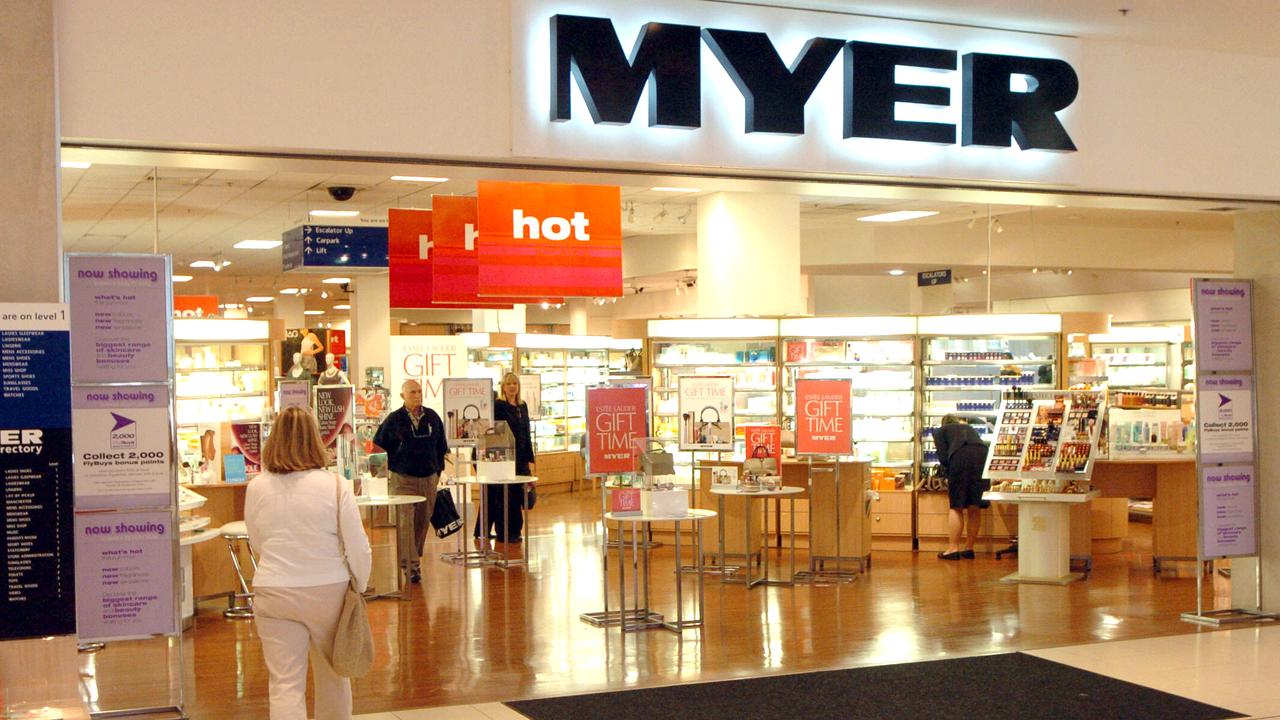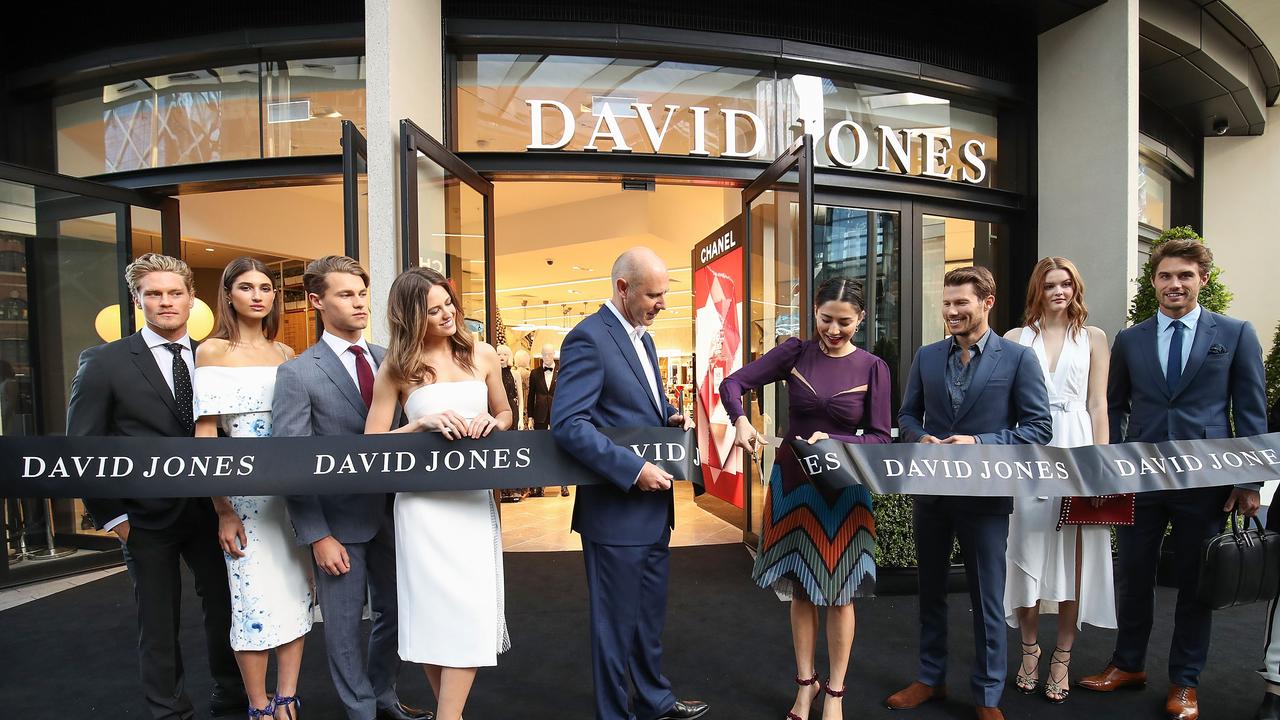Myer and David Jones to shrink and restyle its brand offering amid retail struggles
As Myer and David Jones continue to downsize stores, one retail analyst says the fierce rivalry will end with one closing altogether.
The wide open expanses of the Myer and David Jones stores synonymous with Australian retail will compress and shrink over the next few years.
Both major department stores have laid out plans to downsize stores and reduce the amount of shops, while the major brands Aussie shoppers once relied on the two stocking will be removed from shelves.
But one retail analyst says the downsizing strategy won’t be enough and has forecast at least one of the two to close its doors altogether.
“There really is not going to be a long term place for two department stores,” DGC Advisory retail analyst Geoff Dart told news.com.au.
Myer chief executive John King told investors earlier this year when the company reported its half-year earnings that reducing space to ease the debilitating rent costs was a “massive priority”.

The chain will consolidate its network of 61 locations under the plan to operate smaller, cheaper and more efficient sites.
Mr King said Myer will reduce its floor space by 30,000 square metres by August.
“Supported by a full offer online, that gives us the opportunity to significantly improve the profitability of our space,” he said.
“One example is our Cairns store where we will be extending our lease but reducing the store from two floors to one bigger floor and as part of the space reduction we will improve the merchandise offer and the in store experience.
“So we end up with a better customer offer, a smaller better laid out store and, more importantly, a more profitable store.”
Major brands are also on the chopping block at Myer with its announcement last week it will stop selling “unprofitable” Apple Inc products as part of its drive to focus on higher-margin items.
It will cull the iconic technology product from 16 stores currently stocking it.
“Myer has made it clear that it will not chase unprofitable sales and has made this decision as we could not reach acceptable commercial terms that were in the best interests of the company and shareholders,” a spokesperson told news.com.au.
“This decision is also about ensuring space in our stores is utilised in the most productive and effective way for the company.”
Much like the smaller convenience store-style Woolworths and Coles have been opening, David Jones has focused on smaller floor space in its new stores to modernise the shopping experience.

The miniature department store at Sydney’s Barangaroo opened in late 2016 was the first of this fleet, with the South African owned chain preferencing a layout of 1400 square metres over two floors — one-tenth the size of the chain’s average department store.
This model allows both David Jones and Myer to offer a more curated range of products to suit a local demographic rather than trying to meet the needs of a broader market, Queensland University of Technology retail expert Gary Mortimer told news.com.au.
Myer doesn’t release specific sales performances from its smaller stores such as those in James Street in Brisbane and Sydney’s Warringah Mall, but Dr Mortimer said the cheaper rent and manageable inventory would be a bonus for the chain.
He said Myer’s stores in outer-suburbs and regional towns will eventually close, leaving only the centralised flagship stores as well as the miniature department stores.
Mr Dart is even less confident in the survival of the department store format, saying one of the two major stores will close its doors altogether.
Downsizing and modifying the brands in store to increase profit margins won’t work because younger consumers don’t see any relevance in the brand, he said.
“Which is why profits have been declining every year for 15 or 16 years, revenue is not growing and that can only get worse,” Mr Dart said.
“It’s a brand issue, it’s like Coca-Cola trying to say they’re healthy.”
‘NO ONE’S GOING TO BUY A MYER-BRAND SUIT’
Myer’s half-year result to the end of January showed private and exclusive labels accounted for $292.2 million worth of revenue, or around 17 per cent of sales. While Myer’s private-label brands grew by 3.7 per cent, sales of its branded ranges fell by a similar amount.
The store has said “exclusive brands” is one of its focus areas, and in 23 stores it has experimented with making the products more prominent with “encouraging results” on sales.
But QUT retail guru Gary Mortimer told news.com.au that while private labels could be easy to spot in supermarkets — just look for the Coles or Woolies brands — in department stores it was far tricker.
“No one’s going to buy a Myer suit, but they might buy a Blaq suit which is the same thing,” he said.
In Myer, own brands include Basque, Milkshake and Vue. In David Jones, Studio W and Re: are brands owned by the firm’s ultimate owner, South Africa’s Woolworths Holdings.
However, what is considered a private label is becoming a grey area. Few people would see Country Road or Witchery as an own brand, yet they too are owned by Woolworths, and the company is ripping the names out of Myer so DJs can say it’s the only department store hosting the fashion names. Equally, Sass and Bide has gone from upstart independent to wholly owned Myer brand.
Myer and David Jones are also busily signing up “exclusive” brands. These are brands owned by a separate company but only distributed in Australia through one of the big two.
Mr Mortimer said there was only upside for retailers with private label: “By owning the intellectual property of the brand and not dealing with the manufacturer or distributor you can generate more margin or, alternatively, lower prices. You can also tailor your product to fit the market.”
While own brand is not new in department stores, they have taken longer to double down on private label compared with supermarkets.
“It’s the Aldi effect. When Aldi entered the market, supermarkets thought Aussie shoppers wouldn’t accept private label because it was the cheap generic version of the real deal. What Aldi has demonstrated is that private label products can be as good as the national brand product — they’ve legitimised private label,” said Mr Mortimer.
Continue the conversation on Twitter @James_P_Hall or james.hall1@news.com.au



